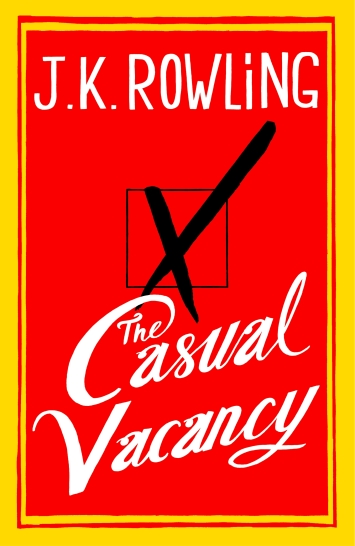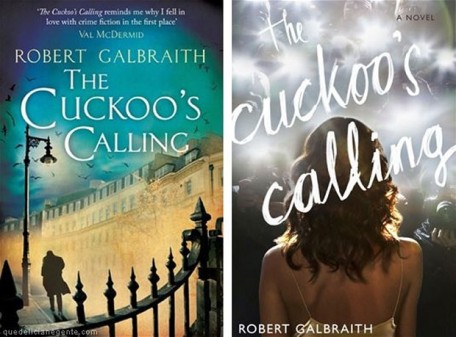Missing her extraordinary work (which was my first reading journey) that was the Harry Potter series, I was excited to know that my writing inspiration and hero, J.K. Rowling, will be back on the literary scene. But this time, riding off from Platform 9 ¾, she wanders and writes about the Muggle world. Her much-awaited return to fiction with her home country as the backdrop was a welcome departure from the Wizarding World (London is one my dream destinations because of her.). But sadly, no charms, spells, and even potions can reverse my dissatisfaction on Rowling’s new narratives.
@@@@@@@@@@
Frankly speaking, J.K. Rowling is much better off writing more chapters of the Wizarding World than chronicling the unexciting lives of Londoners in her two novels since ending Harry Potter. Her first book published last 2012, The Casual Vacancy is a dreary read about a community who basically hates each other and their animosity is further fueled when their (except the Mollisons) only unifying factor, beloved councilman Barry Fairbrother, died at the beginning of the story. The hostility in each character seeps from every paragraph and the reader inadvertently absorbs this hate, scowling on every page until he/she is freed after the final punctuation. The novel tosses from different families with varying domestic dramas as each unlikable family member teeters to the brink of self-destruction. The synopsis itself warns of the characters-at-war whom you do not want to spend with during night reading: bottomless arguments between husbands and wives, parents and children, opposing political parties, and the building blocks of the rowdy social pyramid.
Each character is a reflection of the pangs in the real world and it is a messy ordeal to the eyes and mind. The ending does not entirely redeem (spoiler!) the remaining characters even if they were able to resolve their respective storylines. (Readers are forced to be relieved consequent to their exasperation after finishing the book.) While Rowling stays true in deglamorizing and dissecting numerous domestic and societal issues: rebellious and hormone-driven teenagers, tarnished reputations, questionable parenting, political predators, and sufferers and abusers of all sorts (substantial, physical, even technological), The Casual Vacancy does not make up for a compelling and desirable material. No matter how relatable or similar the conflicts are in reality, the story itself is not extraordinary, not even uplifting nor value-laden, to be immortalized in a book.
What The Casual Vacancy can better do is to occupy an effective medium that can carry the tedious atmosphere of Pagford and its citizens. There are at least six families (with coerced boyfriends and closeted mistresses) of mixed ethnicities, accents, and social statuses, which are sometimes difficult to follow despite Rowling’s efforts on interlacing them towards the climax and resolution. The novel is crowded by displeasing personalities and disinteresting relationships. While imagination may find it intolerable to shape every word into their tainted beings, it would have been better if they were alive on screen, and it turns out, they will be. To my delight, BBC Films and HBO are set to bring The Casual Vacancy to the small screen. The adaptation should spare viewers from the literary toils in the book. The actual town of Pagford, its sights and scenes, will be better grasped onscreen and the lengthy dialogues will be more engaging (and entertaining) if they were blurted in character. Cinematography and production designs are an artistic plus but the key on appreciating Rowling’s material is through the actors who can perfectly preen and poise to the egos of their fictional counterparts. The mini-series will be shown this year and it will be worth seeing if the outcome will be critically acclaimed (or likewise dissed) from the source material.
It was only during the last chapters of the book that I realized what the front cover stood for: the voter’s mark on the ballot at Election Day. As for me, it stands for: (1) the X that does not hit the spot of my expectation; and (2) the X which should be read as ‘Not worthy of your reading’. But as a devoted fan of J.K. Rowling, I give The Casual Vacancy a reprieve because of the moral story buried underneath the naggings and bashings per chapter. In anthropology, the family is the basic unit of the society. The Casual Vacancy is Rowling’s attempt of decomposing the society into its broken familial pieces who altogether constitutes the community which they despise. The future of Pagford remains uncertain but there is a fleeting hope in the ending that the strengthened familial bonds will build towards a stronger and more compassionate society.
But then again, Rowling’s first Muggle-based book is a dull beginning after dusting herself off of Floo powder.
@@@@@@@@@@
The second cover more appropriately glimpses on the world Strike steps into: swallowed by fame, hypnotized by beauty, blinded by power, and killed by greed.
A year later, J.K. Rowling downs a flask of Polyjuice Potion to assume the identity of Robert Galbraith, author of the warmly-received The Cuckoo’s Calling. Again, it took me about three-quarters of the book to decipher the mystery behind the title (because the clues popped out on the latter part). (Spoiler) ‘Cuckoo’ is the moniker of Lula Landry, a famous young model pertained to as a masterpiece of her ethnicity (Nigerian) but fell to her death from her balcony at the fourth floor of one of the posh apartments in London. Initially ruled out as suicide, her death was investigated three months later by Cormoran Strike, a former military man who was hired by Landry’s co-adoptive brother, lawyer John Bristow, on the angle of murder.
The crime fiction is at times funny because of Strike’s awkward interactions with his temporary secretary, Robin Ellacott. But apart from the usual inquests and noir atmosphere of its genre, The Cuckoo’s Calling is a budding character story of Strike who himself is a basketful of mystery: peripatetic childhood without his rock star father, aborted university stint, on-and-off relationship with his now ex-fiancee, and homelessness save for his ballooning unpaid rent of his office. Standing more than six feet tall with a body of a boxer, Strike’s intimidating surface is a thick shell of a broken man carved of emotional scars. While Strike has become Rowling’s new muse for a series (The sequel The Silkworm is now out in the US and UK), I am still hesitant on delving to Strike and Robin’s new case because of a number of inquisitive issues on Rowling’s first take on crime fiction.
Not that I’m setting my bar too high but the first detective novel I read was Stieg Larsson’s The Girl With The Dragon Tattoo, a more complex case of familial conspiracy discovered by a journalist and a hacking genius with photographic memory, whose complicated relationship further heightened their suspenseful investigation. Both books (TCC and TGWTDT) are centered on unearthing family secrets by an unlikely teamwork (Mikael Blomkvist was a disgraced financial journalist while Lisbeth Salander was mentally-instituted now socially abused bisexual; Strike is living in penury and heartbroken while Robin is in elation of her recent engagement and under-employed). As compared to TGWTDT, The Cuckoo’s Calling is a novice in terms of compelling story-telling and conflict-building, granted that Rowling’s first crime novel is still welcomed despite its flaws. What the book lacks, despite Rowling’s eloquent literary establishment of London and admirable narrative of Strike’s inner workings and observations, is the element of intrigue which glues the reader’s curiosity. TCC is better written than TCV but Strike’s account on Landry’s relations easily slips away and does not registering to the reader who is supposed to bear the same level of attentiveness as required by the genre. The book is a slow-burner but that should not impede its ability to engage its readers; letting them speculate the who’s and why’s of the crime. Strike’s final confrontation at the denouement felt like a spoon-feeding of truths and lies, to my irk. I am not sure if the same tactic is actually the norm of the genre but TGWTDT did not make me feel that way, and surely will my unread copy of Sherlock Holmes’ tales.
(SPOILER!) As for the story itself, I am less than satisfied who the killer was, who turned out to be Bristow. As Strike figured out, Bristow and his sister were in a heated argument after he tried to coerce Landry on giving him money after he swindled one of the top partners of their family’s law firm. Before that evening, Landry visited her adoptive mother who recalled the death of her eldest son, which Tony Landry, Lula’s uncle, had insisted was John’s doing. Lula repeatedly called her uncle and her boyfriend (thus one-half of the title), the former to know the truth and the latter to seek consolation. Not giving away the rest of the story, Bristow indeed has the “motive, means and opportunity” but why hire Strike in the first place? If Bristow is really in dire need of money, where did he even get the pocket for Strike’s generous compensation? Hiring the childhood friend of the brother he killed who might even found out his first murder further glares the question ‘WHY’? The Cuckoo’s Calling is selling Bristow as a bat-shit crazy brother and lawyer (he is the real cuckoo after all) who is overtly confident in wiping off his murderous fingerprints, but I am not buying that assertion. In creating a villain of a lesser evil than Voldemort, Rowling tumbles in completely exploring and reasoning the anatomy of her main antagonist. Rather than sweeping the readers below the rug, Bristow’s reveal as a villain was a letdown of promising detective stories from Rowling.
Overall, The Cuckoo’s Calling is a decent detective novel, albeit a quagmire on its villain. Here I am again, granting another reprieve since this is Rowling’s first crime fiction and also hoping that The Silkworm will be an improvement. What I look forward to in the sequel is the rapport between the private detective and his (permanent) secretary. While Strike’s past is gradually peeled off like a banana until his vulnerable core is exposed, Robin is the lighthouse of her boss’ well-being. She saves Strike’s skin during their investigative visits and still carries herself gracefully on tricky and awkward situations. Good-looking and prim, Robin is a street-smart professional whose ingenious improvisations significantly helped solving the Landry case. While deemed too attractive to work for Strike, Robin chose her current profession (than a human resources position) because (like everyone else) her childhood dream is to become a detective and it is an opportunity she cannot simply pass. Her fact-finding skills surprises Strike but most of all, she is a compassionate character who becomes the nutcracker of Strike’s thick shell. Like the glass door that separates the receiving area from Strike’s office, Robin keeps her professional distance on Strike’s personal affairs but she quietly observes her boss’ personal strains and in Strike’s breakdown, Robin looked out for him despite the disliking of her fiance. With a renewed contract and stronger working relationship, I’m excited on the Strike and Robin dynamic for The Silkworm. I hope Rowling will explore their teamwork and how their personal lives would tangle with their new case; and a possible romantic angle between them is last on the list. Clearly there is no sexual tension between Strike and Robin (even the thought of it baffles them) and they were mentally vocal in not crossing that line. I just want them to solve cases together and be the genre’s new dynamic duo to watch.
@@@@@@@@@@
This may not be my fondest review on Rowling’s new works but still, she remains as my all-time favorite author. Thank you for reading! Feel free to comment! 😀

